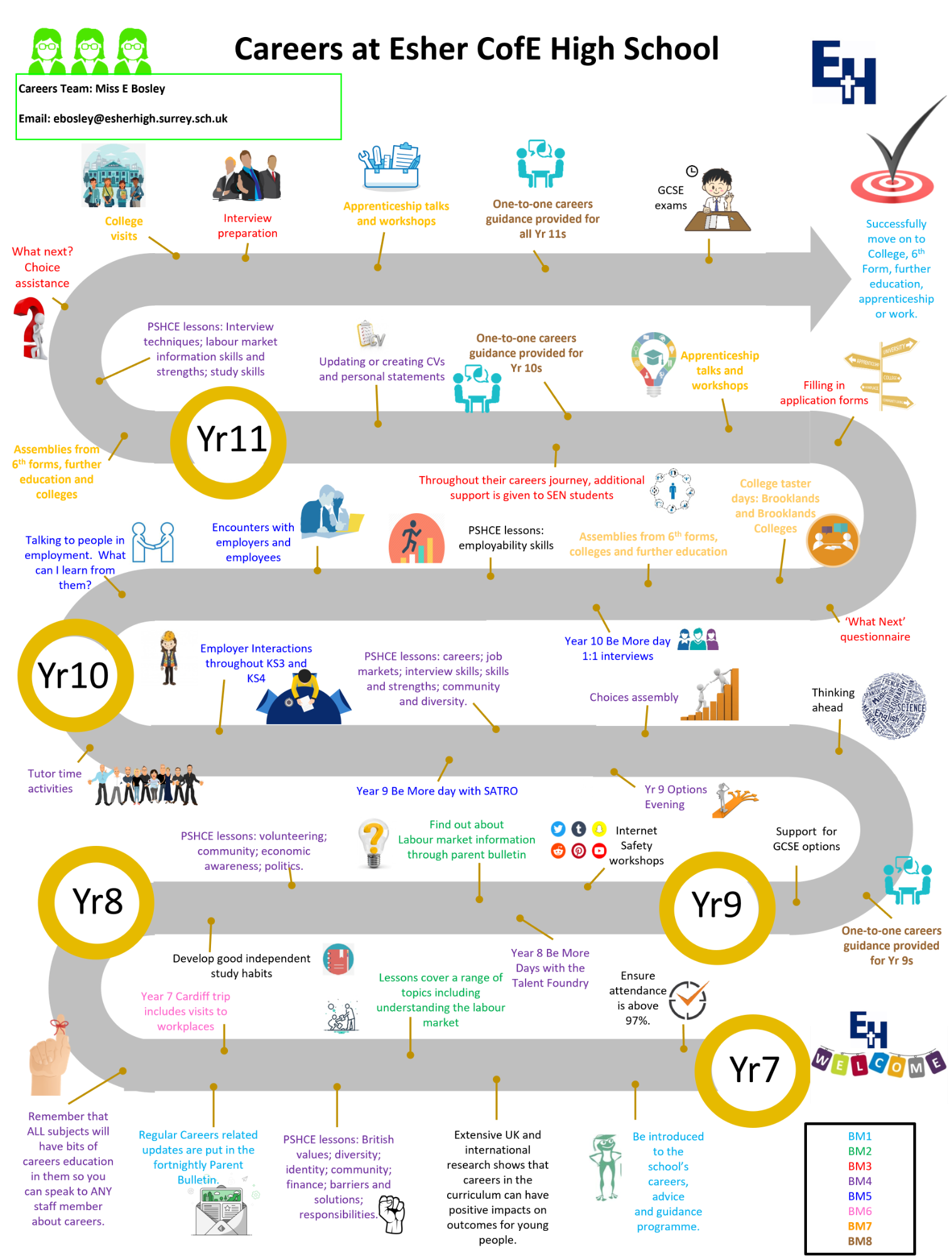Students

Post-16 options
What are the options?
When you are in Years 10 and 11 you will need to make plans for once you leave Esher High School. It is important that you make the best choice for you. The main options you will need to choose from are: A levels, BTECs, apprenticeships and traineeships.
It is really important that you check the entry requirements for not only your intended college, but for the individual courses/subjects too; for some subjects (often maths and physics) a grade 6 at GCSE is required in order to study further. For some BTEC courses, subject grades at GCSE may determine whether you begin a level 1 or level 2 course.
A-levels
Usually you will study 3 subjects over two years, which will be tested at the end of the two-year course. These are academic, require a lot of independent study and reading, essays, revision and for many can represent a big challenge. You need a minimum grade 4 in English Language and Maths (though some colleges stipulate a 5), and usually grade 5 or 6 in your chosen subjects to progress to A-level. A-levels keep your options open and are the usual route into university or higher (degree level) apprenticeships. It is important to make sure that the choice of A-levels is ‘fit for purpose’, and doing some research for A-levels for university courses is important. For example, there are some degrees and university courses which require you to have very specific A levels. It is definitely worth looking at course on UCAS to find out this information.
BTECs
A BTEC is where you learn about a subject and how it relates to an industry, building your knowledge and skill through theory and coursework projects, but also through lots of practical learning activities. A BTEC course usually fills the timetable so only one is chosen. There are different levels of BTEC depending on the GCSE grades and you can generally progress from one level to another. BTECS are typically assessed through project/coursework, and sometimes exams too.
Apprenticeships
Apprenticeships are training-centred routes and are available in a vast range of sectors from construction to banking, catering to sales. Some of our previous students have undertaken some fascinating apprenticeships with film companies, legal companies, even in the House of Lords.
Typically, you will be in a work place most of the time, though there is an element of study which is often (not always) taught at a college. Most apprenticeships pay a small wage and have good working conditions attached to them. They tend to become advertised from February each year when National Apprenticeship Week takes place, though are increasingly being advertised throughout the year.
Some apprenticeships require you to be registered onto a particular college and a particular course, for example, British Airways recruit their engineering apprentices from a particular course at Kingston College. Check this sort of information before applying.
Below is a list of our local FE and Sixth Form colleges:
- Brooklands College:www.brooklands.ac.uk
- Esher College: www.esher.ac.uk
- Farnham College:www.farnham.ac.uk
- Guildford College:www.guildford.ac.uk
- Heathside School Weybridge (6th Form): https://www.heathside.surrey.sch.uk/sixth-form
- Kingston College:www.kingston-college.ac.uk
- Merrist Wood College: www.merristwood.ac.uk
- Woking College:www.woking.ac.uk
Following is a list of websites and links providing information on a variety of Post-16 Options:Information on apprenticeships can be found at: https://amazingapprenticeships.com/resources/
Information on finding an apprenticeship can be found at: https://www.gov.uk/apply-apprenticeship
Apprenticeship vacancies in engineering, manufacturing, computing, and design and technology can be found at: https://www.tomorrowsengineers.org.uk/
Residential courses at universities if you are interested in a career in engineering: https://www.smallpeicetrust.org.uk/course-category/momentum/
National Careers Service – a comprehensive careers website with job profiles, outlining: the skills required, main tasks, pay levels and career prospects for hundreds of different jobs. In addition, valuable guidance on the different stages involved in getting a job.
Careers Pilot – comprehensive information on the jobs market in the south-west. Contains information on the main employment sectors, including the number of people working in that sector and whether the number is projected to increase or fall. In addition, information on job salaries, relevant subject areas, top employers and types of apprenticeships.
Icould – helpful videos about a wide range of job roles
UCAS – a very helpful website for students thinking of applying to higher education. Also contains valuable information on different options, including apprenticeships

